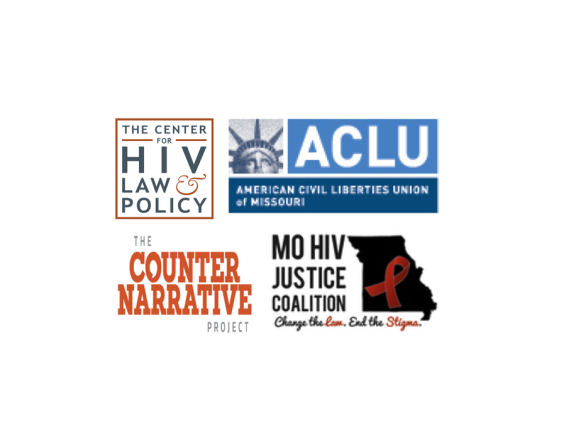News Release: Michael Johnson Bypasses Trial, Enters No-Contest Plea (2017)

FOR IMMEDIATE RELEASE
Contact: Mayo Schreiber, 646.338.5991
Kate Boulton, 212.430.6733
Michael Johnson Bypasses Trial, Enters No-Contest Plea and
Is Sentenced to 10 Years For Not Disclosing HIV Status to Male Sexual Partners
Original conviction overturned due to prosecutorial misconduct, but possibility of a nearly 100-year sentence under Missouri law led Johnson to accept plea deal
New York, NY, September 21, 2017 – Today, in conclusion to a prosecution short on fairness and riddled with questions about racism and homophobia, Michael Johnson entered a plea in the St. Charles County Circuit Court in Missouri. Earlier this year, a state appeals court vacated his original conviction due to prosecutorial misconduct that, according to the court, made Johnson’s first trial “fundamentally unfair.”
However, because Missouri’s HIV criminal law hinges liability on whether or not the defendant can prove he disclosed his HIV status prior to sex – a virtual impossibility in most instances – Johnson decided to accept a plea deal that credits him with time served. Under Missouri’s law, one of the harshest in the country, Johnson could have faced up to 96 years in prison if found guilty.
“It is disturbing that Michael is not yet a free man and was not exonerated after his years-long struggle for justice, but we respect and support his decision not to risk a life behind bars,” said Mayo Schreiber, Deputy Director of the Center for HIV Law and Policy (CHLP). “It likely is the end of his case, but our work to bring an end to HIV criminal laws like Missouri’s continues.”
Johnson, who was 21-years-old at the beginning of this case, entered a no-contest plea to charges that he had sex with partners without first advising them of his HIV status. In exchange, he has accepted a sentence of 10 years in state prison, which will include time already served since his arrest nearly four years ago. He previously had been sentenced to 30 years in prison before the appeals court threw out the original conviction.
Prior to his arrest in 2013, Johnson was a promising young college student and star athlete. His prosecution has drawn condemnation from state and national organizations and individuals uniformly outraged by his conviction and opposed to these fundamentally unfair laws being used to prosecute people living with HIV and, disproportionately, like all other criminal laws in the United States, people of color.
“Johnson’s conviction has shattered a talented young man’s life,” says Charles Stephens, Executive Director of the Counter Narrative Project. “The sentence imposes punishment that is grossly out of proportion to the alleged harm.”
"These laws create a separate standard for PLHIV while actually placing their partners at risk,” said Dr. Jeffrey Birnbaum, Executive Director of the HEAT Program at SUNY Downstate Medical Center, one of the nation’s largest clinics for young people living with HIV. “In intimate relationships, lots of HIV transmissions occur among people who do not even know they are living with HIV. Relying on what you think you know about a partner, or what they know or tell you, is a pretty sure way to eventually get some kind of STI, whether HIV, herpes or HPV."
Rose Farnan of the Greater Kansas City Chapter Association of Nurses in AIDS Care notes “The law treats HIV as a death sentence rather than the treatable, manageable disease it has been for years. Unlike people diagnosed with cancer caused by the HPV virus, people living with HIV have a life expectancy approaching that of HIV negative people.”
“The law does not even require an intent to harm someone, unlike other felonies in Missouri,” according to Anthony Rothert, Legal Director of the American Civil Liberties Union of Missouri Foundation. “There was no evidence at trial that Johnson intended or even thought of harming someone.”
D. Rashaan Gilmore, Program Director of Blaqout, Kansas City, says "these laws have no effect on HIV diagnosis rates; they foster neither safer sex practices nor shared responsibility for sexual health. Black Missourians continue to bear a disproportionate burden of HIV.”
The laws do, however, increase HIV stigma. Ashley Quinn, staffing the MO HIV Justice Coalition, a project of Empower Missouri, notes “these laws promote negative characterizations of people living with HIV (PLHIV), by assigning fault and branding PLHIV as criminals, and exposing PLHIV to isolation and discrimination. As a result, these laws work at cross-purposes with efforts by Missouri’s Department of Health and Senior Services to stem the spread of HIV.”
Missouri’s criminal HIV exposure law, and similar laws in other states, are opposed by the U.S. Department of Justice, Presidential Advisory Council on HIV/AIDS, American Medical Association, American Psychological Association, National Alliance of State and Territorial AIDS Directors, Association of Nurses In AIDS Care, Infectious Diseases Society of America, and HIV Medicine Association, among many other organizations.
###
The Center for HIV Law and Policy is a national legal resource and strategy hub for HIV advocacy. CHLP hosts the only online resource bank focused on HIV law and policy in the United States, and supports the lawyers, legal services providers, and community advocates on whom people who experience HIV discrimination rely.